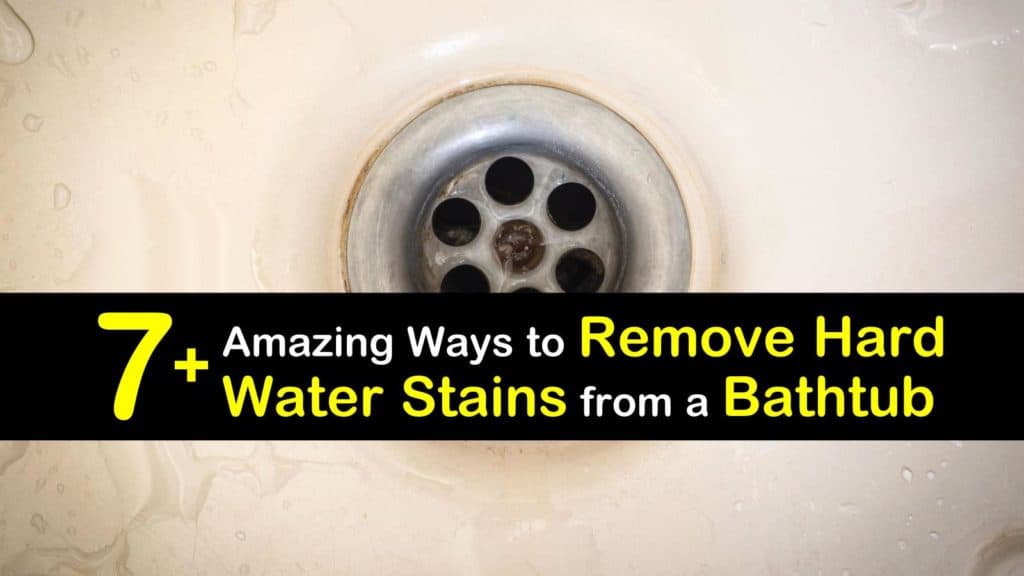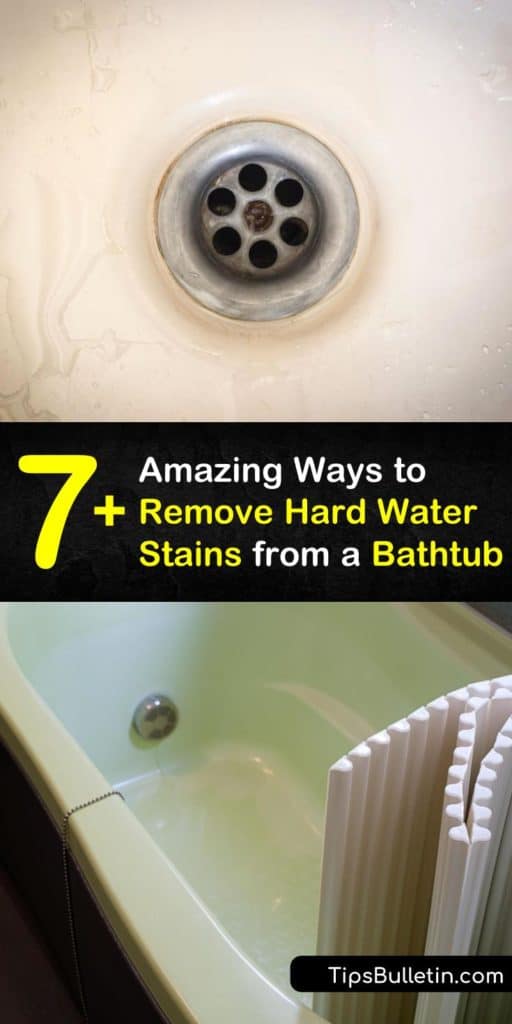Find out how to remove hard water stains from a bathtub quickly and easily with our simple cleaning tips. They don’t require harsh chemicals or bleach, so rest assured that you, your family, and the environment are safe.
Chances are, you have most of these items at home already. Try one of our recipes to find the ideal cleaning solution for your household. Have you noticed unsightly stains on your bathtub, toilet bowl, and other water fixtures? Does a cloudy film coat your shower curtains or glass shower doors?
If so, you’re probably one of the 85 percent of households across the country with hard water. But don’t worry, there are numerous easy cleaning methods for removing hard water stains and calcium deposits from bathtub.

- Easy Ways to Remove Hard Water Stains from a Bathtub
- Mix Vinegar With Water
- Add Dish Soap to Vinegar Spray
- Mix Lemon Juice with Water
- Add Lemon Essential Oil to Water
- Mix Hydrogen Peroxide with Water
- Make a Cleansing Scrub with Baking Soda and Vinegar
- Make a Cleansing Scrub with Cream of Tartar and Vinegar
- Erase Calcium Deposits from Bathtub and Glass Shower Doors
- Add Vinegar to Regular Cleaning Products
- Remove Calcium Deposits from Bathtub and Faucets with Toothpaste
- How to Prevent Hard Water Stains
- What Causes Hard Water Stains?
- How to Remove Hard Water Stains from a Bathtub
Easy Ways to Remove Hard Water Stains from a Bathtub
If you think back to science courses at school, you’ll remember that acid neutralizes a base. Mineral deposits are alkaline, so you need to use an acid to dissolve them.
White vinegar, apple cider vinegar, hydrogen peroxide, and lemon juice are all mild acids and natural disinfectants that are effective and safe to use at home. Here are easy DIY recipes for ways to remove hard water stains from a bathtub.
Try one of our recipes for the best homemade bathtub cleaner and use these simple cleaning methods for removing stubborn hard water stains.
Mix Vinegar With Water
Vinegar is a powerful cleanser for removing hard water stains that is safe to use on fiberglass or metal. Clean hard water stains from a plastic bathtub with it, too. Since it’s acidic, vinegar dissolves mineral deposits and disinfects surfaces at the same time.
Combine equal parts white vinegar or apple cider vinegar and water in a clean spray bottle and spray surfaces thoroughly.

Leave it to sit for a minimum of 15 minutes to allow the acid in the vinegar to dissolve the mineral deposits. Wipe the tub clean with a dry microfiber towel.
Add Dish Soap to Vinegar Spray
Adding dish soap to the vinegar spray helps lift stubborn hard water deposits and prevents them from reattaching to the bathtub.
Add a small squirt of dish soap to the vinegar spray recipe above to eliminate hard water stains. Spray surfaces thoroughly, and scrub tough stains with a sponge or paper towels.
Mix Lemon Juice with Water
Citric acid is effective at cleaning fibreglass with hard water deposits. Lemon and lime juice have similar amounts of citric acid, although lemon juice is slightly stronger.
Combine two parts lemon juice and one part water in a spray bottle and spray surfaces thoroughly. Let it soak for a minimum of 15 minutes, then wipe clean with a dry microfiber towel.
Add Lemon Essential Oil to Water
In addition to the citric acid, using lemon essential oil has the extra benefit of preventing future hard water stains because the oil prevents minerals from attaching to surfaces.
Add lemon oil to the water, swirl the mixture for a few seconds to blend, and then follow the lemon juice spray’s instructions.
Mix Hydrogen Peroxide with Water
Hydrogen peroxide is a natural substitute for bleach and works as the best way to clean a fiberglass tub and remove hard water stains.
Combine equal parts hydrogen peroxide and water in a spray bottle, then follow the instructions for the vinegar spray.
Hydrogen peroxide can also be used to help remove peeling bathtub paint. Use this spray as a lubricant on the peeling paint. Then, take a plastic spatula to scrape the rest of the paint off the plastic bathtub.
Make a Cleansing Scrub with Baking Soda and Vinegar
Baking soda is a natural scrubbing agent that lifts stubborn hard water stains without scratching your bathtub. Borax is a good alternative for similar results. You can also try this simple solution to remove hard water deposits from toilet bowl.
To clean calcium buildup in a toilet bowl or the tub and shower, add vinegar to the baking soda and mix until it forms a paste similar to cake frosting. Spread the paste evenly over stains and let it sit for 15 minutes.
Scrub with a non-abrasive sponge or brush, rinse with warm water and wipe clean with a dry microfiber towel. Use an old toothbrush as an eraser for hard-to-reach places like the faucet, shower head, and drain.
Make a Cleansing Scrub with Cream of Tartar and Vinegar
Cream of tartar has the added perk of making vinegar more acidic to remove calcium deposits from bathtub even better.
Mix and apply the paste following the instructions above to remove stains from glass shower doors, your tub or toilet, and erase your most stubborn hard water stains.
Erase Calcium Deposits from Bathtub and Glass Shower Doors
By using coconut oil mixed with lemon and peppermint essential oils, you not only get your bathtub and glass shower doors sparkling again but also create a natural soap scum remover to prevent future mineral buildup.
Spread the coconut oil evenly over surfaces and let it sit for at least 15 minutes. Scrub grime and soap scum, and remove limescale using a soft-bristled brush. Use paper or microfiber towels to wipe away excess oil, then buff with a new towel.
Add Vinegar to Regular Cleaning Products
The acidity of vinegar is one of the best homemade fiberglass shower cleaners. It will give your bathroom cleaner an extra boost for erasing stubborn hard water stains without compromising their disinfectant power.
Ammonia provides a similar effect, but it’s crucial to never add ammonia to cleaning products containing bleach for safety reasons.
Remove Calcium Deposits from Bathtub and Faucets with Toothpaste
Toothpaste works wonders to remove hard water stains, especially on glass shower doors and metal fixtures like the faucet, drain, and shower head. It’s a mild abrasive that won’t scratch surfaces.
Squirt a small amount onto an old toothbrush, sponge, or cloth and scrub the stain. Use a wet sponge or cloth to wipe away the toothpaste, then dry with a microfiber towel or a squeegee.
How to Prevent Hard Water Stains
To permanently eliminate hard water, you need to install a water softener that will remove minerals from the water before it flows through your pipes. The average cost of installing a water softener is $800 and up.
What Causes Hard Water Stains?
Hard water stains occur when water containing high amounts of alkaline minerals like calcium, magnesium, manganese, and iron evaporate. These minerals build up and cause discoloration or stains.
Calcium deposits mainly cause chalky white residue or limescale. Dark brown or black stains are a result of high levels of manganese in the water. Iron causes orange, rusty colored stains.
While hard water isn’t a health risk, it clogs your pipes and reduces the efficiency of water-using appliances like water heaters, dishwashers, and washing machines.
Hard water deposits shorten the working lifespan of your appliances by up to 50 percent. Over time, the minerals can also eat away at plumbing and cause small leaks.
How to Remove Hard Water Stains from a Bathtub
We hope you enjoyed reading about these recipes for homemade cleaning products and how to remove hard water stains from a bathtub.

If you found these bathtub cleaning tips helpful, please share this article about simple ways to remove hard water stains from a bathtub with your friends and family on Pinterest and Facebook.